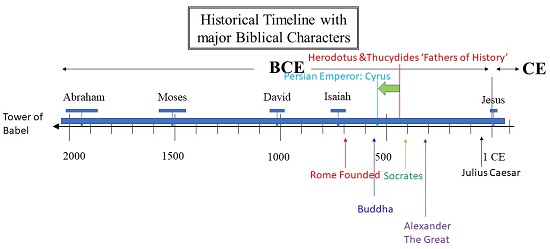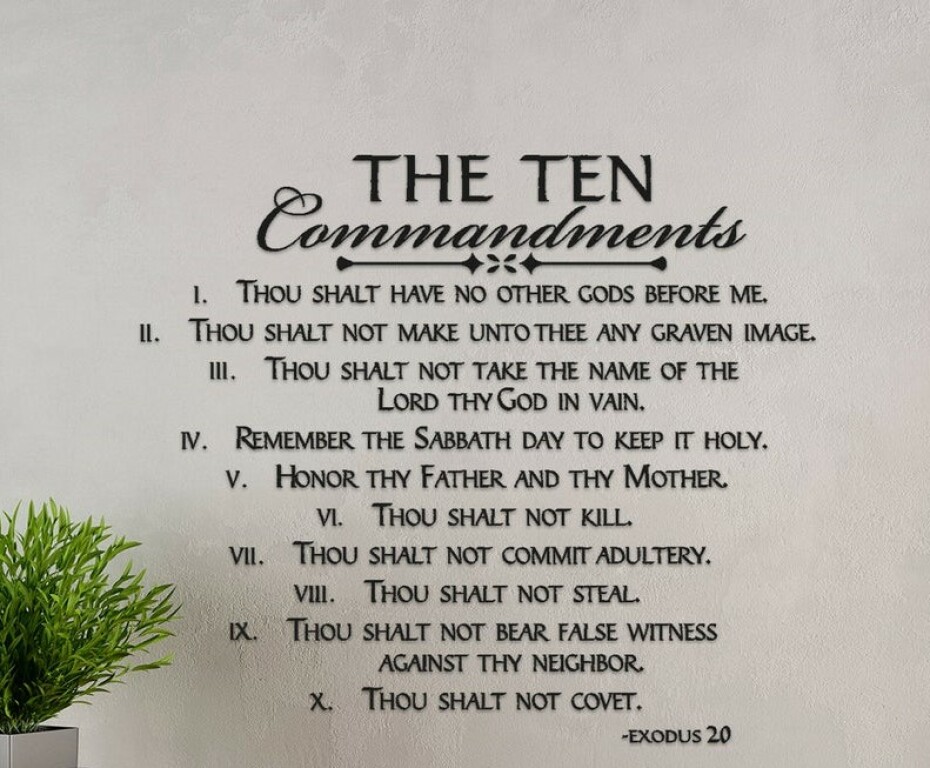Moses wrote the first five books of the Bible. These books describe the birth of the Israelite nation thousands of years ago. Moses’ mission was to birth this nation to become a light to surrounding nations. He began by leading the Israelites (or Jews) out of slavery in Egypt through a rescue known as Passover. In Passover God liberated the Israelites in a way that pointed to a future deliverance for all mankind.

But Moses’ call was not only to lead the Israelites out of Egyptian slavery. His mandate was also to lead them to a new way of living. So fifty days after Passover Moses led them to Mt. Sinai where they received the Law.

So what commands did Moses receive? The complete Law was quite long, with 613 specific commands. But Moses first received a set of specific 90ots of stone, known as the Ten Commandments. These Ten formed the summary of the Law – the moral prerequisites before all the others. The Ten Commandments (sometimes called Decalogue) are God’s active power to persuade us to repent. This is what we examine in this article.

Author unknown, photograph by Shai Halevi, Public domain, via Wikimedia Commons
The Ten Commandments
Here are the Ten Commandments as written by God on the stone. Then Moses recorded them in the book of Exodus of the Bible.
And God spoke all these words:
2 “I am the Lord your God, who brought you out of Egypt, out of the land of slavery.
3 “You shall have no other gods before me.
4 “You shall not make for yourself an image in the form of anything in heaven above or on the earth beneath or in the waters below. 5 You shall not bow down to them or worship them; for I, the Lord your God, am a jealous God, punishing the children for the sin of the parents to the third and fourth generation of those who hate me, 6 but showing love to a thousand generations of those who love me and keep my commandments.
7 “You shall not misuse the name of the Lord your God, for the Lord will not hold anyone guiltless who misuses his name.
8 “Remember the Sabbath day by keeping it holy. 9 Six days you shall labor and do all your work, 10 but the seventh day is a sabbath to the Lord your God. On it you shall not do any work, neither you, nor your son or daughter, nor your male or female servant, nor your animals, nor any foreigner residing in your towns. 11 For in six days the Lord made the heavens and the earth, the sea, and all that is in them, but he rested on the seventh day. Therefore the Lord blessed the Sabbath day and made it holy.
12 “Honor your father and your mother, so that you may live long in the land the Lord your God is giving you.
13 “You shall not murder.
14 “You shall not commit adultery.
15 “You shall not steal.
16 “You shall not give false testimony against your neighbor.
17 “You shall not covet your neighbor’s house. You shall not covet your neighbor’s wife, or his male or female servant, his ox or donkey, or anything that belongs to your neighbor.”
Exodus 20: 1-17

The Standard of the Ten Commandments
Now a day, we sometimes forget that these were commands, not suggestions or recommendations. But to what extent are we to obey these commands? The following verse comes just before the giving of the Ten Commandments:
Then Moses went up to God, and the Lord called to him from the mountain and said, “This is what you are to say to the descendants of Jacob and what you are to tell the people of Israel…
Exodus 19:3
Now if you obey me fully and keep my covenant, then out of all nations you will be my treasured possession. Although the whole earth is mine,
Exodus 19:5
Moses recorded the following just after the giving of the Ten Commandments.
Then he took the Book of the Covenant and read it to the people. They responded, “We will do everything the Lord has said; we will obey.”
Exodus24:7
Ten Commands – Not Multiple Choice
Let’s think about this. Sometimes in school exams, teachers gives multiple questions (for example 20). But then they requires students to only answer some of the questions. For example, students can choose any 15 questions out of the 20 to answer. Each student would pick the 15 easiest questions for him/her to answer. In this way the teacher makes the exam easier.
Many people treat the Ten Commandments in the same way. They think that God, after giving the Ten Commandments, meant, “Attempt any six of your choice from these Ten”. We think this way because we instinctively imagine God balancing our ‘good deeds’ against our ‘bad deeds’. If our Good merits outweigh or cancel our Bad imperfections then we hope this suffices to earn God’s favor. Or at least maybe get a pass to heaven. For this same reason, many of us try to earn religious merit through religious activities. These often include; going to church, mosque, or temple, praying, fasting, and giving money to the poor. These acts hopefully balance out the times we disobey one of the Ten Commandments.
However, an honest reading of the Ten Commandments shows that this was not how God gave it. People are to obey and keep ALL the commands – all the time. The sheer difficulty of accomplishing this has made many rebels against the Ten Commandments. The well-known atheist Christopher Hitchens attacked the Ten Commandments for this reason:
“… then comes the four famous ‘shalt nots’ which flatly prohibit killing, adultery, theft, and false witness. Finally there is a ban on covetousness, forbidding the desire for ‘thy neighbours’… chattel. … Instead of the condemnation of evil actions, there is an oddly phrased condemnation of impure thoughts…. It demands the impossible…. One may be forcibly restrained from wicked actions…, but to forbid people from contemplating them is too much…. If god really wanted people to be free of such thoughts, he should have taken more care to invent a different species”
Christopher Hitchens. 2007. God is not great: How religion spoils everything. P.99-100

Why did God give the Ten Commandments?
But to think either that God can accept a 50%+ effort, or that God made a mistake in demanding the impossible, is to misunderstand the purpose of the Ten Commandments. God gave us the Ten Commandments to help us identify our problems.
Let’s illustrate this with an example. Suppose you had a hard fall onto the ground and, hurt your arm badly. However, you are unsure of the internal damage. Is the bone in your arm broken or not? You are unaware if it will get better, or if you need a cast on your arm. So you take an X-ray of your arm, and the X-ray reveals the true situation. Yes indeed, you broke the bone in your arm. Does the X-ray heal your arm? Is your arm better because of the X-ray? No, your arm is still broken. But now you know that it is indeed broken, and you need to put a cast on it to heal. The X-ray did not solve the problem, rather it exposed the problem so now you can treat it properly.
The Commands reveal Sin
Likewise, God gave us the Ten Commandments so that we could see a problem deep within us, our sin. Sin means ‘missing’ the target of what God expects from us in how we treat others, ourselves, and God. The Bible says that
The Lord looks down from heaven
on all mankind
to see if there are any who understand,
any who seek God.
All have turned away, all have become corrupt;
there is no one who does good,
not even one. (Psalm 14:2-3)
We all have this inner corrupting problem of sin. This is so serious that God says of our ‘good deeds’ (which we hope will cancel out our sins) that:
All of us have become like one who is unclean,
and all our righteous acts are like filthy rags;
we all shrivel up like a leaf,
and like the wind our sins sweep us away. (Isaiah 64:6)
Our righteous merit in religious observances or helping others counts only as ‘filthy rags’ when weighed against our sins.
But instead of recognizing our problem, we tend to compare ourselves with others. In doing this we measure ourselves against the wrong standard. Alternatively, some strive harder to obtain religious merit. Others give up and just live for pleasure. Therefore God instituted the Ten Commandments so that:
Therefore no one will be declared righteous in God’s sight by the works of the law; rather, through the law we become conscious of our sin. (Romans 3:20)
Examining our lives and seeing our sins against the standard of the Ten Commandments is like looking at an X-ray to see the broken bone in our arm. The Ten Commandments do not ‘fix’ our problem. Instead, they reveal the problem clearly so we will accept the remedy that God has provided. Instead of continuing in self-deception, the Law allows us to see ourselves accurately.
God’s Gift given in repentance
The remedy that God has provided is the gift of forgiveness of sins. He freely gives it through the death and resurrection of Jesus Christ. The article here explains this more fully. God simply extends this Gift of Life to us if we trust or have faith in His work.
know that a person is not justified by the works of the law, but by faith in Jesus Christ. So we, too, have put our faith in Christ Jesus that we may be justified by faith in Christ and not by the works of the law, because by the works of the law no one will be justified. (Galatians 2:16)
We can be given righteousness just like Abraham that was justified before God. But it does require that we repent. Repent means to ‘change our minds’ and involves a turning away from sin and a turning towards God and the Gift He offers. As the Bible explains:
Repent, then, and turn to God, so that your sins may be wiped out, that times of refreshing may come from the Lord
Acts 3:19
The promise for you and me is that if we repent and turn to God, our sins will not be counted against us. Instead, we will receive Life.
That first Passover and Abraham’s test revealed God’s signature in His plan for us. Likewise, the specific day when God gave the Ten Commandments to Moses also points to the coming of the Spirit of God to indwell us. The indwelling Holy Spirit gives us the ability to follow God in a way that we cannot do on our own.